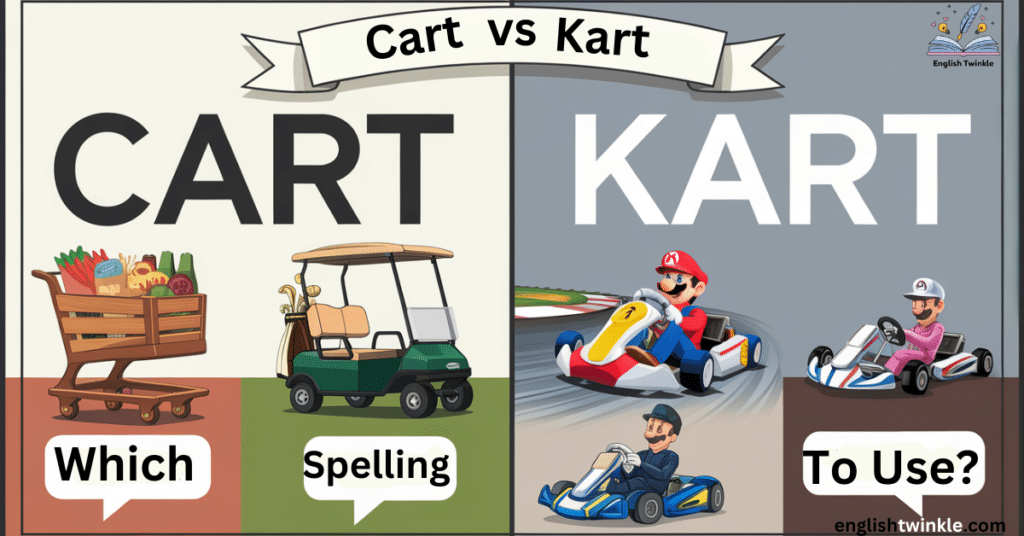In the vast landscape of the English language, few words cause as much confusion as “cart vs kart.” These nearly identical terms often leave writers scratching their heads, wondering which spelling to use. Is it a shopping cart or a shopping kart? Are you racing in a go-cart or a go-kart? Let’s embark on a linguistic journey to unravel the mysteries behind these spellings and ensure you’re always using the correct spelling in every context.
The Evolution of “Cart”
The word “cart” has a rich history that stretches back centuries. Its roots can be traced to Old Norse “kartr” and Old English “cræt,” both meaning a heavy vehicle used for transporting goods. Over time, the spelling evolved to the modern “cart” we know today.
Ancient Origins and Etymology
The concept of a cart as a vehicle for transportation is as old as civilization itself. Archaeological evidence suggests that wheeled vehicles, including primitive carts, were in use as early as 3500 BCE in Mesopotamia.
- Old Norse: kartr
- Old English: cræt
- Middle English: cart, carte
Historical Uses Across Cultures
Carts have played a crucial role in human development, facilitating trade, agriculture, and warfare. Here’s a quick look at some historical uses:
- Agricultural carts: Used for transporting crops and farming tools
- War chariots: Ancient Egyptians and Romans used these in battle
- Merchant carts: Essential for trade in medieval markets
- Horse-drawn carts: A common sight in pre-industrial cities
Modern-day Applications of Carts
Today, the term “cart” is used in various contexts, from traditional wheeled vehicles to digital concepts. Here are some common modern uses:
- Shopping cart: Both in physical stores and online shopping
- Golf cart: Small vehicles used on golf courses
- Food cart: Mobile food vending units
- Hand cart: Small, manually operated carts for moving goods
- Digital shopping cart: Virtual baskets in e-commerce
The Birth of “Kart”
While “cart” has ancient roots, “kart” is a relative newcomer to the English language. Its emergence is closely tied to the world of motorsports and recreation.
When and Why “Kart” Emerged
The term “kart” first appeared in the 1950s, coinciding with the invention of the go-kart. Art Ingels, a hot rod and race car builder, is credited with creating the first go-kart in 1956 in California.
Connection to Motorsports
The spelling “kart” quickly became associated with small racing vehicles. It differentiated these new, lightweight racing machines from traditional carts. The International Karting Commission was established in 1962, further cementing the use of “kart” in motorsports.
Cultural Impact of Go-karting
Go-karting has had a significant impact on popular culture:
- Served as a training ground for many professional race car drivers
- Became a popular recreational activity worldwide
- Inspired video games like the iconic Mario Kart series
Diving Deep: “Cart” vs “Kart”

Now that we’ve explored the origins of both terms, let’s examine the differences between “cart” and “kart” in more detail.
Linguistic Analysis
Phonetic Similarities and Differences
Both “cart” and “kart” are pronounced identically in most English dialects: /kɑːrt/. This similarity in pronunciation contributes to the confusion in spelling.
Morphological Considerations
- Cart: A simple, one-syllable word with a long history in English
- Kart: A deliberate respelling to create a distinct term for a new concept
Semantic Distinctions
Understanding the primary meanings and connotations of each term is crucial for knowing when to use each spelling.
| Term | Primary Meaning | Connotations |
|---|---|---|
| Cart | A wheeled vehicle for transporting goods | Traditional, multi-purpose |
| Kart | A small racing vehicle or a term used in racing-themed contexts | Modern, sport-specific |
Contextual Usage
The choice between “cart” and “kart” often depends on the industry or field in which it’s being used in.
| Context | Preferred Term | Examples |
|---|---|---|
| Shopping | Shopping Cart | Shopping cart, cart abandonment |
| Agriculture | Cart | Farm cart, ox cart |
| Motorsports | Kart | Go-kart, kart racing |
| Gaming | Kart | Mario Kart, kart racer |
The Go-Cart Conundrum
The term “go-cart” presents a unique challenge in the cart vs kart debate. Originally spelled as “go-cart,” it has evolved over time, with “go-kart” becoming the preferred spelling in racing contexts.
History of the Term “Go-cart”
- 16th century: “Go-cart” referred to a framework on wheels to help babies learn to walk
- 20th century: Term adapted for small motorized racing vehicles
Transition to “Go-kart” in Racing Contexts
As go-karting became established as a sport, the spelling shifted to “go-kart” to align with the broader use of “kart” in motorsports.
Current Usage and Preferences
- Go-kart: Preferred in professional racing and most modern contexts
- Go-cart: Still used occasionally, especially in non-racing contexts
“The transition from ‘go-cart’ to ‘go-kart’ reflects the sport’s evolution from a backyard hobby to a professional racing discipline.” – Karting Magazine
| Remember: 1. Cart is your go-to for general wheeled vehicles and shopping contexts 2. Kart is reserved for racing, motorsports, and specific gaming references |
Digital Age Implications
In the digital era, the choice between “cart” and “kart” can have significant implications beyond mere spelling.
Search Engine Optimization Considerations
- “Shopping cart” is the preferred term for e-commerce SEO
- “Kart” is crucial for ranking in racing and gaming-related searches
Brand Naming Strategies
Companies must carefully consider their spelling choice:
- “Cart” for traditional or broad-appeal businesses
- “Kart” for racing-themed or youth-oriented brands
Social Media Hashtag Usage
- #ShoppingCart for retail and e-commerce
- #GoKart for racing enthusiasts
- #MarioKart for gaming communities
Pop Culture and Media Representation
The use of “cart” and “kart” in popular media has helped shape public perception and usage of these terms.
“Cart” and “Kart” in Literature
- Classic literature often features horse-drawn carts
- Modern fiction may use “kart” in racing scenes or futuristic settings
Video Games and the Popularity of “Kart”

The immense success of the Mario Kart franchise has cemented “kart” in gaming lexicon:
- Mario Kart (1992)
- Crash Team Racing (1999)
- ModNation Racers (2010)
- Team Sonic Racing (2019)
Movies and TV Shows Featuring Carts and Karts
- “The Fast and the Furious” franchise often features karting scenes
- Period dramas like “Downton Abbey” showcase historical cart usage
Grammar Rules and Style Guides
When it comes to formal writing, it’s essential to consult authoritative sources for the correct spelling.
What Major Dictionaries Say
| Dictionary | “Cart” Definition | “Kart” Definition |
|---|---|---|
| Merriam-Webster | A vehicle or container on wheels | A small motorized vehicle used for racing |
| Oxford English | A strong vehicle with two or four wheels | A small motor vehicle for racing |
| Cambridge | A large basket on wheels used in shops | A small, light racing car |
AP Stylebook and Chicago Manual of Style Guidelines
- AP Stylebook: Use “go-kart” for the racing vehicle
- Chicago Manual of Style: Follows dictionary preferences; use “kart” only in specific racing contexts
Industry-specific Style Preferences
- Motorsports publications: Consistently use “kart”
- Retail industry: Prefer “cart” for shopping-related terms
Common Mistakes and How to Avoid Them
Even experienced writers can stumble when it comes to the cart vs kart distinction. Here are some common pitfalls and how to sidestep them.
Misuse in Formal Writing
Mistake: Using “kart” in general contexts where “cart” is standard. Solution: Reserve “kart” for specific racing or gaming contexts.
Inconsistencies in Branding
Mistake: Mixing “cart” and “kart” within the same brand or document. Solution: Choose one spelling and stick to it consistently.
Tips for Remembering the Correct Usage
- Cart is for Carrying (goods, groceries)
- Kart is for Karting (racing)
- When in doubt, “cart” is the safer choice for general use
The Future of “Cart” and “Kart”
As language evolves, so too might the usage of “cart” and “kart.” Let’s explore some potential trends and predictions.
Linguistic Trends and Predictions
- Increased acceptance of “kart” in general usage due to pop culture influence
- Possible divergence in meaning, with “kart” becoming more specialized
Technological Advancements Influencing Usage
- Self-driving shopping carts may reinforce the “cart” spelling in retail
- Virtual reality karting could further popularize “kart” in gaming contexts
Potential for Further Divergence or Convergence
- “Cart” may retain its broad meaning while “kart” becomes more niche
- Alternatively, “kart” could gain ground in general usage, especially among younger generations
Word Meanings, Examples, and Synonyms
To further clarify the usage of “cart” and “kart,” let’s explore their meanings, examples, and synonyms in more detail.
Cart
| Aspect | Details |
|---|---|
| Definition | A wheeled vehicle or container typically used for transporting goods |
| Examples | Shopping cart, horse-drawn cart, golf cart, food cart |
| Synonyms | Wagon, trolley, carriage, buggy, wheelbarrow |
| Aspect | Details |
|---|---|
| Definition | A wheeled vehicle or container typically used for transporting goods |
| Examples | Shopping cart, horse-drawn cart, golf cart, food cart |
| Synonyms | Wagon, trolley, carriage, buggy, wheelbarrow |
Usage in a sentence: “The farmer loaded his cart with fresh vegetables to take to the market.”
Kart
| Aspect | Details |
|---|---|
| Definition | A small, open, wheeled vehicle used for racing or recreation |
| Examples | Go-kart, racing kart, rental kart, indoor kart |
| Synonyms | Go-kart, racing buggy, mini racer |
Usage in a sentence: “The young driver maneuvered his kart skillfully around the tight corners of the track.”
Case Studies: Cart vs Kart in Real-world Applications

To illustrate the practical implications of choosing between “cart” and “kart,” let’s examine two case studies.
Case Study 1: E-commerce Platform Rebranding
An online retailer decided to rebrand their checkout process, considering whether to use “shopping cart” or “shopping kart.”
Decision: They chose “shopping cart” for several reasons:
- SEO benefits: More people search for “shopping cart” than “shopping kart”
- User familiarity: “Shopping cart” is the standard term in e-commerce
- Professional image: “Cart” aligns better with a serious business tone
Outcome: The company saw improved user engagement and higher conversion rates after implementing consistent “shopping cart” terminology across their platform.
Case Study 2: Karting Center Marketing Campaign
A new indoor karting center was developing its marketing strategy and had to choose between “go-cart” and “go-kart.”
Decision: They opted for “go-kart” based on:
- Industry standard: Most professional racing facilities use “kart”
- Target audience: Enthusiasts and serious racers prefer the “kart” spelling
- Brand positioning: “Kart” conveys a more modern, sport-oriented image
Outcome: The center successfully attracted both casual and serious racers, with many customers citing the professional branding as a factor in choosing this facility over competitors.
Conclusion
Navigating the maze of “cart” vs “kart” spellings doesn’t have to be a bumpy ride. By understanding the historical context, semantic distinctions, and contextual usage of each term, you can confidently choose the right spelling every time.
The key is to consider your audience and context. Whether you’re pushing a shopping cart or zooming around in a go-kart, you now have the knowledge to spell it correctly and communicate clearly.

Freck John, linguist and English educator, shares grammar insights and writing tips at English Twinkle, making language concepts accessible to all learners.







